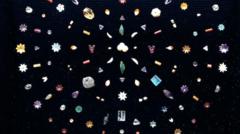The jewels, discovered by English estate manager William Claxton Peppé at a stupa in Piprahwa, near the Buddha’s birthplace, date back nearly 2,000 years. Although many relics were given to various countries for veneration, this cache remained in private hands until now – prompting art historians, Buddhist leaders, and community members to question whether such treasures should be sold like art pieces. The ongoing debate underscores the intersection of cultural appropriation, colonial history, and the rights of indigenous communities.
As the auction nears, the Peppé family, who currently hold the jewels, expressed that they sought an ethical resolution to the ownership question; however, many still contend that these artifacts belong to all Buddhists and should not be commodified. The controversy reflects wider issues regarding the repatriation of cultural heritage and the legacy of colonialism. The auction, set for later this week, may not only redefine the ownership of these relics but also reignite discussions on how societies value their historical legacies.
The sell-off of such culturally significant items reveals ongoing tensions and could be seen as a continuation of colonial disregard for indigenous practices, with many calling for greater accountability in how such relics are handled and transferred moving forward. As Buddhist leaders and scholars voice their concerns, the coming days will be crucial in determining both the fate of these jewels and the deeper implications for cultural heritage globally.
As the auction nears, the Peppé family, who currently hold the jewels, expressed that they sought an ethical resolution to the ownership question; however, many still contend that these artifacts belong to all Buddhists and should not be commodified. The controversy reflects wider issues regarding the repatriation of cultural heritage and the legacy of colonialism. The auction, set for later this week, may not only redefine the ownership of these relics but also reignite discussions on how societies value their historical legacies.
The sell-off of such culturally significant items reveals ongoing tensions and could be seen as a continuation of colonial disregard for indigenous practices, with many calling for greater accountability in how such relics are handled and transferred moving forward. As Buddhist leaders and scholars voice their concerns, the coming days will be crucial in determining both the fate of these jewels and the deeper implications for cultural heritage globally.




















